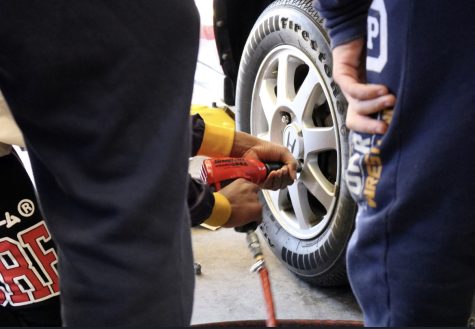Students deserve auto tech education
Let’s start with a pop quiz. If there was a strange noise coming from your car, what would you do? If the check engine light came on, or if your car felt different, would you be able to diagnose the issue? Surprisingly, many Americans are unable to perform simple maintenance on their vehicles.
America produces more cars than any nation on earth, besides China. Despite our high rates of car ownership, many Americans are unable to perform basic upkeep. According to a 2016 survey conducted by CheapCarInsurance.net, a surprising 21 percent of 2,000 Americans surveyed do not know how to change a flat tire, and 36 percent are clueless on how to change their car’s oil. With the number of registered cars rising each year, should it be mandatory for young Americans to take an automotive class?
“I think [some] form of an automotive class should be mandatory,” said Nicholas Michalek, who teaches automotive technology courses at Oak Park River Forest High School. He suggested “something that’s really basic, just so that you understand how your car works, what happens when it doesn’t work, how not to be taken advantage of when you have to take your car in.”
Michalek also pointed out automotive classes could prevent car owners from being manipulated by auto shops, save owners money on repairs and allow for maintenance on their own schedules.
Students can also apply the knowledge they learn in auto class to additional subjects in school like physics, engineering and math. Americans without the knowledge of auto repair may fall victim to scams or unnecessary repairs. A survey by the
American Automobile Association (AAA) found 6 percent of Americans do not trust auto shops because of negative past experiences, 49 percent do not trust they will do the job correctly, and 73 percent believe that they will be overcharged for the service.
While some may argue trade classes should not be mandatory, the trades are useful for students. Trade school is affordable compared to college.
The average tuition of a two-year trade school is $3,588 compared to $31,875 for a four-year college.
On average, a trade school graduate will make $42,000 a year starting salary with very little debt.
People often misinterpret trade workers as unintelligent or lazy, but the truth is quite the opposite. Many trades require you to be excellent at problem solving, customer service and subject knowledge. Auto mechanics commonly have to use unconventional methods to solve complex problems.
According to the U.S. Bureau of Labor Statistics, while almost three quarters of current high school students believe it’s important to consider alternative options to a traditional four year college, just 30 percent of students considered trade or vocational school. More than half say they don’t know enough about it as their reason for not considering trade school. This is a problem that could be solved with the introduction of auto class in high school. And, 79 percent of high school students say they believe vocational skills should be taught in high schools, showing that there is interest in learning more about the skills needed to go into the trades like auto.
Students can learn how to care for their cars and their families’ cars, saving everyone time and money. Some students will learn how much they enjoy fixing cars and might make a career out of it. This could be a great option for someone who doesn’t want to attend a four-year college but wants to earn a good living, or people who like to work with their hands and solve problems.
All of the data points to having auto class mandatory in United States high schools as a good thing.



